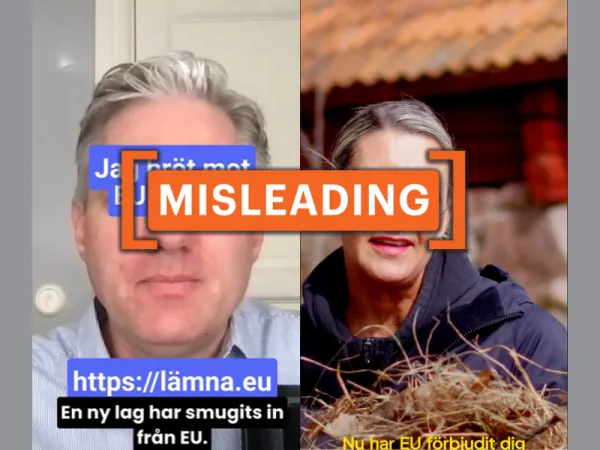By: Christian Haag
April 23 2024
 Examples of claims made on TikTok. (Source: TikTok/Screenshot/Edited by Logically Facts)
Examples of claims made on TikTok. (Source: TikTok/Screenshot/Edited by Logically Facts)
The EU has issued a directive on waste management in the Union, but these are implemented with national law, not by the EU.
Context
Claims have been circulating on social media that the EU has forbidden the burning of garden waste in Sweden. Users and EU-sceptic politicians have also disseminated the claim on TikTok, as can be seen here, here, and here.
A Swedish law implemented such a policy at the turn of the year, causing confusion in Sweden. But the claim is misleading.
In fact
In 2018, the EU directive on waste and repealing was amended, and member states were obliged to improve their biowaste management by the end of 2023. The directive aims to determine measures to protect the environment and human health by reducing or preventing waste and facilitating the EU's transition into a circular economy. Unlike a regulation, a directive is not directly applicable and must, therefore, be transposed into national law. The member state – in this instance, Sweden – decides how the directive will be implemented.
In December 2022, following the EU directive, the Swedish Government decided on amendments to the Swedish Waste Regulation (Avfallsförordningen), which entered into force on January 1, 2024. The new regulations were interpreted as a ban on burning garden waste.
In a press release, the Swedish Environmental Protection Agency writes that biowaste recycling should be prioritized and that the new regulations prohibit the burning of garden waste. However, the municipalities can make exceptions, such as if the nearest recycling center is too far away. Erika Nygren, Head of Unit at the Waste and Chemicals Unit at the Swedish Environmental Protection Agency, echoed this on Swedish radio channel P4, saying that burning garden waste at home is better for the environment when the pros outweigh the cons.
Nygren told Logically Facts that "it is not true that the EU has banned the burning of garden waste in Sweden. The EU has drawn up a directive aimed at the Member States with requirements for managing biowaste, but unlike an EU regulation, an EU directive does not apply directly; it must be implemented in national legislation. What applies here is national legislation decided by the government. The Environmental Protection Agency is the supervising authority and primarily informs the municipalities that supervise the provisions of the regulation."
Ebba Bush, Deputy Prime Minister and Minister for Energy, Business, and Industry, stated on X (formerly Twitter) that municipalities should look towards exceptions and that “We recognize that these can be interpreted in different ways, and the rules will therefore be clarified.” Romina Pourmokhtari, Minister for Climate and Environment of Sweden, stated that the provisions of the new law will be clarified within two months, and emphasized the municipalities' ability to implement exceptions.
With 290 municipalities in Sweden, different interpretations are commonplace. The Halmstad municipality concluded that the new regulations still allow for the burning of garden waste from October 1 to March 31, as long as it doesn’t cause a disturbance. In contrast, the Luleå municipality has prohibited the burning of garden waste, but is going to update its regulations in accordance with the new law. However, it specifies that garden waste does not include waste from agriculture or forestry.
The verdict
The EU has not forbidden the burning of garden waste in Sweden. Confusion has arisen due to the interpretation of the national legislation introduced by the Swedish government, which is planning to clarify the law, and municipalities are able to be flexible and consider exceptions. Therefore, we have marked this claim as misleading.